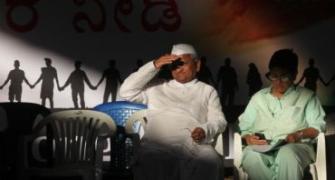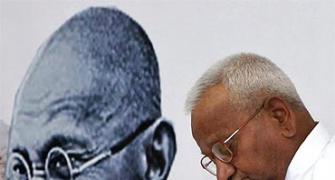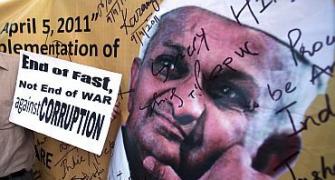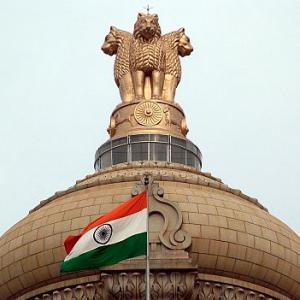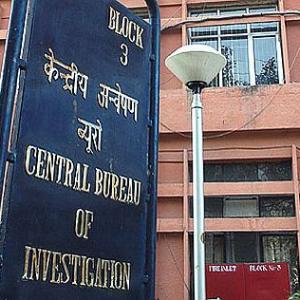The inclusion of the Lokayukta factor in the bill approved by the Cabinet is expected to become a sticky point in Parliament. Sheela Bhatt reports.
The Lokpal Bill is unlikely to pass in both Houses of Parliament a senior government source told rediff.com, speaking on condition of anonymity. The source was privy to the process of drafting the bill and has seen the final copy of the bill passed by the Cabinet on Tuesday.
"I find it impossible. This bill will not stand the scrutiny of many MPs. There are too many sticking points. Some members would like to tear it away. Anna Hazare can go on fast, but just to cajole him, the members of Parliament won't accept anything given to them," the government source said.
The Bharatiya Janata Party has already commenced its objection to the bill, saying it disagrees with the provisions related to the Central Bureau of Investigation. The BJP's problem with the government's bill is predictable, but those political parties who have not spoken much as yet on the bill are likely to reject it on other issues.
Some political parties will have a serious problem with the 50 percent quota for weaker sections and minorities.
The government source, who is well-versed with parliamentary procedures, said, "There are two issues the government will not be able to respond to. The bill that the Cabinet has approved is vastly different from the bill that was tabled in Parliament on August 4. The difference between the two bills is of an elephant and a donkey!"
Even the name of the bill has changed from the Lokpal Bill, 2011 to the Lokpal and Lokayukta Bill, 2011, he added.
Some MPs, he argued, would insist that this new bill should be sent to the Standing Committee for review just as the old one was.
On Monday, while speaking to the media, Pawan Bansal, the parliamentary affairs minister, had revealed that the bill tabled on August 4 would be withdrawn and a new bill would replace it.
Bansal said recently the Companies Bill had come back to Parliament from the Standing Committee after suggestions asking for 125 plus amendments. Many of the suggestions were accepted and incorporated in the final draft. The new Companies Bill was introduced in Parliament, but it was not sent to the Standing Committee.
Bansal hoped that MPs would not ask the government to send the new Lokpal bill to the Standing Committee. But the government is not sure that the bill, which was approved by the Cabinet on Tuesday, would be accepted without any member insisting that the normal procedure be followed.
A more serious issue that could become a sticking point is the inclusion of the Lokayukta factor in the bill approved by the Cabinet. When the Lokpal Bill was tabled in Parliament on August 4, it was named the Lokpal Bill, 2011, because it had no mention of the Lokayukta.
In the final version of the bill, the Lokayukta has been mentioned. The government is bound to do so because the Lok Sabha had promised under the 'Sense of the House' resolution that, 'This House agrees 'in principle' on the following issues -- (i) citizens' charter, (ii) lower bureaucracy under the Lokpal through an appropriate mechanism, and (iii) establishment of Lokayuktas in the states.'
Accordingly, the Cabinet on Tuesday approved this highly controversial addition to the Lokpal Bill, which will surely be questioned by many state governments.
Former Chief Justice of India Justice J S Verma put forth his opinion on the issue of creating a provision by the Centre for Lokyauktas in the states. He believes the Centre can bring in the Lokayukta Bill along with the Lokpal Bill.
Justice Verma thinks that Article 253 of the Constitution empowers Parliament to enact a law for India or any part of India.
Last month the government ratified the United Nations Convention against Corruption. It empowers the central government to implement any law to honour the international treaty or its obligations. The government can argue that the international treaty requires it to form a Lokpal at the Centre and Lokayuktas in the states.
The Right to Information Act is one such Act that extends to the whole of India, except Jammu and Kashmir.
In the coming days, the country will see how Parliament is divided on the government's version of the Lokpal and Lokayukta Bill, 2001, and how MPs are covertly united in dumping the idea of a Lokpal.

